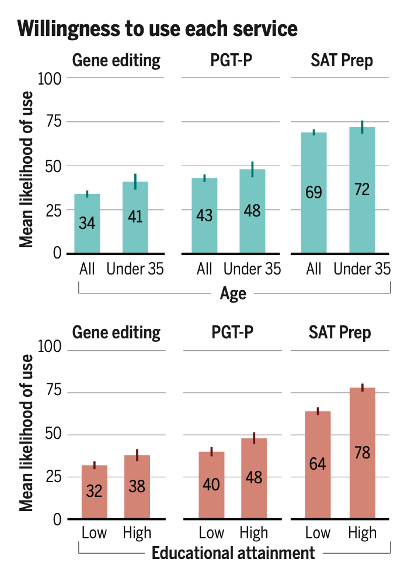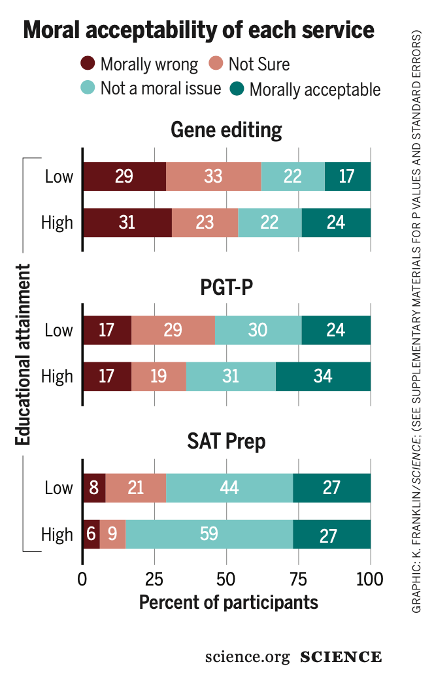Thread by Michelle N. Meyer
- Tweet
- Feb 9, 2023
- #Scientificmethod #Regulation
Thread
NEW in @ScienceMagazine PUBLIC VIEWS ON POLYGENIC SCREENING OF EMBRYOS: We find substantial *superficial* interest in using emerging tech to increase the odds of having a child admitted to a top-100 college & conclude its time to consider regulation www.science.org/doi/10.1126/science.ade1083🧵1/22
This survey study—a collaboration w/Tammy Tan at @NBERpubs, @Dan_J_Benjamin at @dgsomUCLA & @UCLAanderson, David Laibson at @HarvardEcon, & @patrickaturley at @USCDornsife & @CESRUSC—was part of the Jan. '22 wave of the representative Understanding America Survey @UAS_CESR. 2/22
We randomized survey respondents to be asked about 1 of 3 services that could be used to try to enhance educational attainment: preimplantation genetic testing for polygenic risk (PGT-P), germline gene editing (e.g., CRISPR), and—as a non-genetic comparator—SAT prep courses 3/22
Preimplantation genetic testing (PGT) has been around for decades, where it’s been used to screen & select embryos for chromosome abnormalities & monogenic traits like Huntington’s disease, cystic fibrosis & hereditary cancer syndromes (PGT-M) www.acog.org/clinical/clinical-guidance/committee-opinion/articles/2020/03/preimplantation-genetic-te... 4/22
But most human traits are highly polygenic. The recent emergence of polygenic indexes (aka scores)—which sum up the tiny effects of 1000s of genetic variants on complex clinical, behavioral & social outcomes—could expand PGT to virtually any trait. 5/22 www.genome.gov/Health/Genomics-and-Medicine/Polygenic-risk-scores
Companies don’t currently appear to offer PGT-P for non-clinical phenotypes, but they haven’t ruled it out www.genengnews.com/insights/polygenic-risk-scores-and-genomic-prediction-qa-with-stephen-hsu/ & IVF patients can upload their embryo data to DTC sites that analyze DNA for virtually any trait, as one couple did www.bloomberg.com/news/features/2022-05-26/dna-testing-for-embryos-promises-to-predict-genetic-diseas.... 6/22
Germline gene editing could, in theory, also be used to shape complex traits of offspring—not by selecting among IVF embryos to transfer to a uterus, but by making numerous edits to and transferring a single embryo. 7/22
We asked about (1) the moral acceptability of each service in general & (2) their willingness to use it to increase their odds of having a child admitted to a top-100 college, assuming it was free, safe, &—for the reproductive technologies—that they were already using IVF. 8/22
Although we asked Americans about 3 services, our focus is PGT-P. Unlike germline gene editing, PGT-P is already being used, & in the U.S., it is essentially unregulated. And it turns out Americans are more morally accepting of & more willing to use PGT-P than gene editing. 9/22
68% of those asked about SAT prep, 28% of those asked about gene editing, & 38% of those asked about PGT-P said they were more likely than not to use that service to increase their odds of having a child admitted to a top-100 college by 2 percentage points (from 3% to 5%). 10/22
In @NEJM, we previously worried patients & clinicians might overestimate PGT-P’s impact. Yet here we asked respondents to assume a realistic effect size—a 2 percentage point boost in odds of being admitted to a top-100 college—& 38% would use PGT-P www.nejm.org/doi/full/10.1056/NEJMsr2105065 11/22
We randomized respondents to assume that either 90% or 10% of the relevant population (people using IVF or w/teenage kids) already used the service & preregistered the hypothesis that those in the 90% condition would be stat. significantly more willing to use it themselves 12/22
As predicted, the mean willingness to use gene editing, PGT-P, and SAT prep was 4, 5, & 4 percentage points higher, respectively, for those in the 90% condition, suggesting potential for a modest bandwagon/social norming effect. 13/22
In addition to investigating the effect of social norms on willingness to use each service, we conducted two exploratory analyses to see if either moral attitudes or willingness to use differed by respondent age or educational attainment. 14/22
Those under 35 yrs & those who themselves have at least a college degree were more likely to use all 3 services to increase offspring educational attainment. These demographics suggest interest in PGT-P might grow generationally & might also exacerbate inequalities. 15/22
Moral attitudes to services didn’t differ by respondent age. But those with at least a college degree were more likely to view SAT Prep, as well as PGT-P or gene editing for “certain medical and nonmedical traits,” as morally acceptable. 16/22
Given how controversial enhancing educational attainment is, 38% is in some ways likely a lower bound on willingness to use PGT-P. 58% of all respondents had no general moral objection to PGT-P for “certain medical and nonmedical traits” 17/22
OTOH, we asked respondents to assume PGT-P was free and safe and that they were already doing IVF. In general, only being able to include a few questions in the UAS means our study has lots of limitations and there’s lots more to learn about public attitudes towards PGT-P. 18/22
In particular, this brief survey capturing reflexive views about PGT-P in 1 specific scenario, w/limited info, is NOT a substitute for understanding their considered views under a range of circumstances & is not a meaningful endorsement of PGT-P. 19/22
The time to start meaningfully engaging the public—& multidisciplinary experts—about how we want to approach this emerging technology is now. Attitudes towards new technologies can change quickly—sometimes for better, sometimes for worse—creating limited windows for action. 20/22
As we say, we don’t prejudge the outcome of the conversation we call for but note "public attitudes alone"—even considered ones, which these are not—"do not determine appropriate policy." Here are just some of the many things to consider. 21/22
Thanks for reading—and to my collaborators. Preregistration/materials and code are available at osf.io/krj8t; data are available through @UAS_CESR. 22/22
Mentions
See All
Eric Topol @EricTopol
·
Feb 12, 2023
The 1st survey to assess public views of polygenic testing of embryos before implantation (commercially available in the US without data to supports it use) had surprising results @ScienceMagazine this week Excellent explainer thread below, by the report's first author



